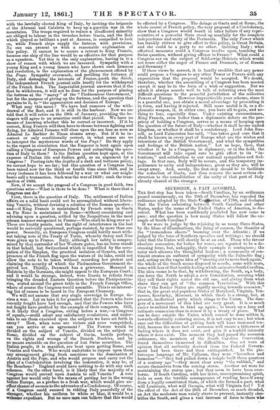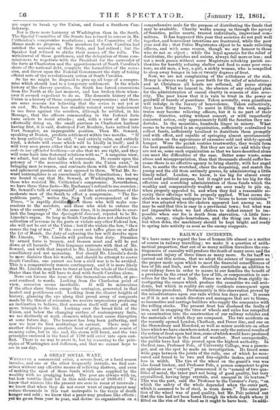SECESSION, A FAIT ACCOMPLI.
Tax first step has been taken—South Carolina, by an ordinance passed unanimously, on the 20th of December, has repealed the ordinance adopted by the State roalltntion of 1788, and declared that the Union subsisting betwee South Carolina and other States, under the name of the United States of America, is dis- solved. What has been confidently predicted has now come ti pass ; and the question is how many States will follow the ex- ample of South Carolina?
If we were tojudge by the rejoicing in so many Slave States, by the blaze of illuminations, the firing of cannon, the thunder of the "tremendous cheers" booming over the Atlantic ; if we judged by the tone of Southern speeches and writings ; we should infer that the Union will shortly be at an end. Those who favour absolute seoesssion, for better for worse, are reported to be a de- creasing force, but, unhappily, their example is contagious • the noisy mob silences the thoughtful leaders ; a community of sen- timent creates an outburst of sympathy with the Palmetto flag ; and, acting on the vague idea of moving out to move back again," the whole of the South seems disposed to secede, some with more, some with less of that hostile feeling which animates South Carolina. The idea seems to be that, by withdrawing, the South, aa,a body, • can force the North to adopt a new Constitution, securing what they call their rights under the old one, and giving them what share they can get of "the common Territories." With this view " the Border States are rapidly moving towards secession," that is, the great and populous States of Maryland, Virginia, Ten- nessee, Kentucky, Missouri, in which there is a strong, but, at present, ineffectual party which clings to the Union. The dan- gers of a movement of this kind are very great. It is so muck easier to unbind than to bind up again ; to break up a long and. intimate connexion than to renew it by a treaty of peace. What can be done outside the Union which cannot be done within it, towards effectually restoring union, it is not easy to see ; but when once out the difficulties of getting back will have increased ten- fold, because the mere fact of secession will create a bitterness of feeling where it does not exist, and give it a tenfold intensity where it does exist. The moment they had passed the secession ordinance, the members of the South Carolina Convention found themselves immersed in difficulties. One set were of opinion that all authority derived from the Federal Govern- ment had been there and then extinguished. In the pic- turesque language of Mr. Calhoun, they were " houseless and homeless"—" they had pulled down a temple built three quarters of a century ago"—they must clear away "the rubbish," and secure themselves from the coming storm. Another set were for maintaining the status quo ; but they seem to have been over- borne. If South Carolina, with her fierce, uncompromising spirit, feels so soon the terrible consequences of rending herself away from a legally constituted State, of which she formed a part, what will Louisiana, what will Georgia, what will Virginia feel ? Yet the effect of the Act of the 20th of December, so much dreaded, an Act the moderate men vainly strove to prevent, instantly elec- trifies the South, and gives a vast increase of force to those who
are eager to break up the Union, and found a Southern Con- federacy. Nor is there more harmony at Washington than in the South. The Special Committee of the Senate has refused to concur in Mr. Crittenden's compromise resolutions ; and the Committee of the Rouse made no progress. The members for South Carolina had notified the secession of their State, and had retired ; but the Speaker had refused to strike their names off the rolls. The withdrawal of these gentlemen, and the delegation of three com- missioners to negotiate with the President for the surrender of the forts at Charleston and the apportionment of South Carolina's share of the national debt, complete the formalities of the seces- sion, and throw upon the Federal Government the duty of taking official note of the revolutionary action of South Carolina. So far we might be disposed to give up all hope of a compro- mise which should lead to a temporary settlement. In the whole history of the slavery question, the South has forced concessions from the North at the last moment, and has broken them when- ever it seemed expedient to do so. The domestic history of the Union is a history of those conquests and compromises; and there are some reasons for believing that the series is not yet at an end. Mr. Buchanan has steadily resisted every inducement to use force against the seceders, although he notified, in his Message, that the officers commanding in the Federal forts have orders to resist attacks ; and, with a view of the more effectually doing so, the small garrison in Charleston harbour having first, it is said, destroyed Fort Moultrie, have retired into Fort Sumpter, an impregnable position. Then Mr. Seward, speaking at Boston, predicts settlement within two months. "If
we keep entirely cool," he said, " and entirely calm, and entirely kind, a debate will ensue which will be kindly in itself ; and it will very soon prove either that we are wrong—and we shall con- cede to our offended brethren—or else that we are right, and they will come back into fraternal relations with us." A sanguine view,
we admit, but one that talks of concession. He counts upon the potency of " the necessities which made the Union exist," in bringing men to reason, and contrasts them with the short-lived and ephemeral passions of men opposed to them. What Mr. Se- ward contemplates is an amendment of the Constitution; but we are bound to say that Mr. Seward, at Washington, was among those who resisted Mr. Crittenden's compromise. Nevertheless, we have these three facts—Mr. Buchanan's refusal to use coercion ; Mr. Seward's talk of compromia ; and the active exertions of the moderate men of the South to effect a compromise. " The Re- publicanparty," writes the New York correspondent of the (
Times, ' is rapidly dividinetinfb those who will make con- cessions to the seceders, an those who wish to enforce the laws of the country." At the same time, it is impossible to over- look the language of the Springfield Journal, reputed to be Mr. Lincoln's organ. So long as South Carolina does not obstruct the colleotion of revenue in the ports or violate any other Federal law, she will not be out of the Union ; but if she violate the law, " then comes the tug of war." If the overt act tares place on or after the 1st of March, the duty of enforcing the law will devolve upon Mr. Lincoln. "Mr. Lincoln will perform that duty. Disunion by armed force is treason, and treason must and will be put down at all hazards." This language contrasts with that of Mr. Seward, and with that imputed to Mr. Lincoln himself, which is conciliatory and not menacing,. But should Mr. Lincoln's deeds be more decisive than his words, and should he attempt to coerce South Carolina, one cannot see how a civil war is to be avoided. This is a comparatively remote contingency, and it is more likely that Mr. Lincoln may have to front at least the whole of the Cotton `States than that he will have to deal with South Carolina alone.
None can foresee the issue of this tremendous conflict, at pre- sent confined to words. Looking from the Charleston point of view, secession seems inevitable. It will be miraculous if the other slave States escape the contagion, generated in that heated and pestiferous soil. Looking from the clearer heights of history, glancing the eye along that proud array of conquests made by the threat of secession; we receive impressions producing an inclination to believe, that secession itself will only add one more triumph to the list. Looking over the broad field of the Union, and below the changing surface of contemporary facts, we -see distinctly at work elements which must cause disruption at some future day. The tempest has long been gathering, and now we hear its first mutterings in earnest. There may be another delusive pause, another hour of grace, another season of seeming calm, but in the end, the storm will burst, and the two principles enclosed in the bond of 1789 will enter into open con- flict. There is no way to avert it, but by recurring to the prin- ciples of Washington and Jefferson, and that we cannot hope to see in our day.



























 Previous page
Previous page